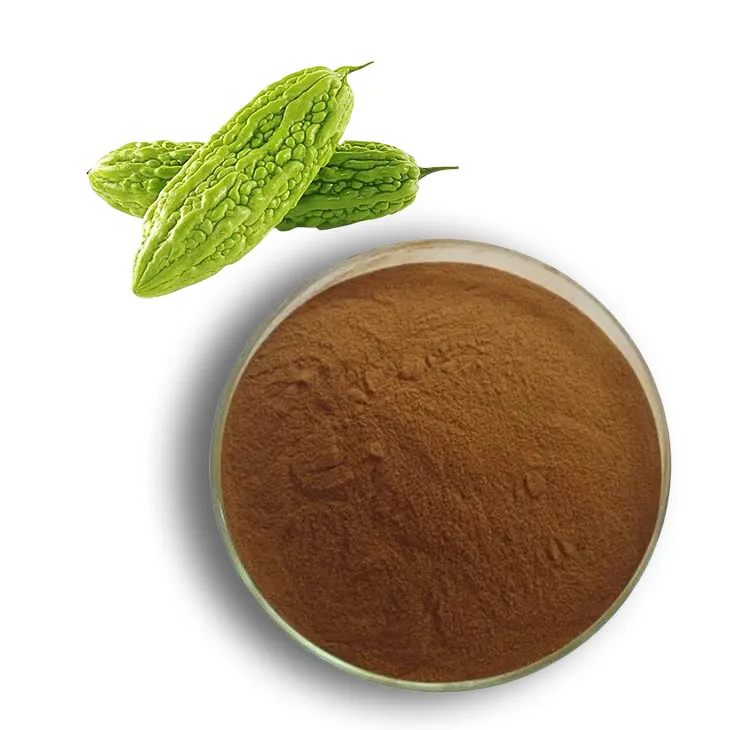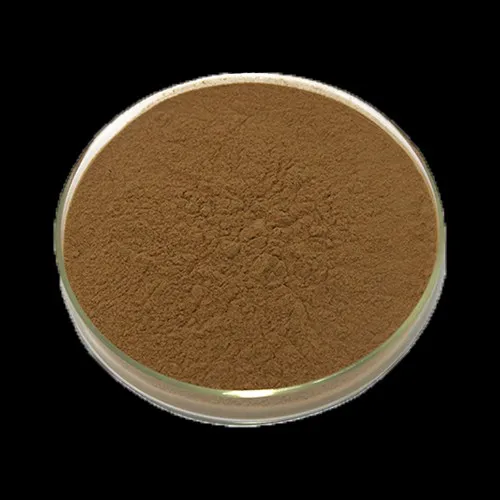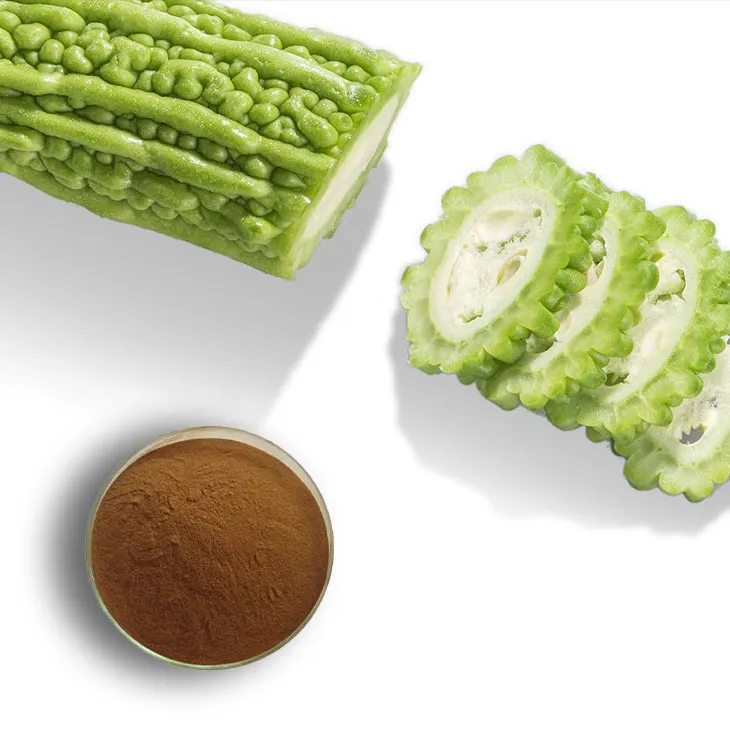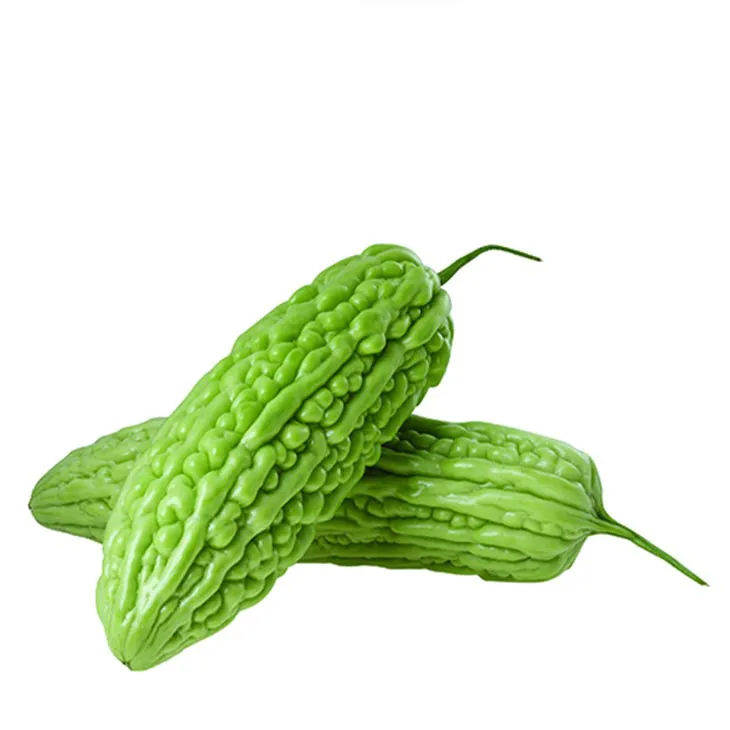- 0086-571-85302990
- sales@greenskybio.com
Benefits of Bitter Melon Extract in Cattle Feed.
2024-11-13

Disease Prevention
Bitter gourd extract is a rich source of various bioactive compounds, which play a significant role in disease prevention among cattle. Bioactive compounds in bitter gourd extract have been shown to enhance the natural defense mechanisms of cattle.
When it comes to bacterial infections, the extract can act as a preventive measure. Cattle are often exposed to different types of bacteria in their environment, such as those present in water sources or in the soil where they graze. Bitter gourd extract can help in strengthening the immune system of cattle, making them more resistant to bacterial invasions. For example, certain components in the extract may have antibacterial properties that can inhibit the growth and spread of harmful bacteria within the cattle's body.
Viral infections are also a major concern in cattle farming. Bitter gourd extract has the potential to boost the immune response against viruses. The complex chemical composition of the extract may trigger the production of antiviral substances within the cattle's body or enhance the function of immune cells that are responsible for fighting viral infections. This is crucial as viral diseases can spread rapidly within a herd and cause significant economic losses due to decreased productivity, increased mortality, and the cost of treatment.

Hormonal Balance
The hormonal balance in cattle is of utmost importance for their growth and reproduction. Bitter gourd extract can have a positive impact on this delicate balance.
Growth - related Hormones
Proper growth of cattle involves the coordinated action of various hormones. Bitter gourd extract may help in regulating hormones related to growth. For instance, it can influence the production and activity of growth hormones such as somatotropin. By ensuring the proper regulation of these hormones, bitter gourd extract can contribute to proper skeletal and muscle development in cattle. Skeletal development is essential for providing a strong framework for the animal's body, while well - developed muscles are important for movement, overall body condition, and meat production in the case of beef cattle.
Reproductive Hormones
In terms of reproduction, the hormonal balance is crucial for fertility and successful breeding. Bitter gourd extract might play a role in maintaining the normal levels and function of reproductive hormones in both male and female cattle. In female cattle, it could affect hormones like estrogen and progesterone, which are involved in the estrous cycle and pregnancy. For male cattle, it may influence testosterone levels, which are important for sperm production and libido. A balanced hormonal state can lead to improved breeding efficiency, reduced infertility problems, and increased calf production in the long run.

Natural Deworming
Internal parasites are a common problem in cattle, and bitter gourd extract can act as a natural deworming agent to some extent.
Parasites can cause a range of problems in cattle, including reduced feed intake, poor growth, and decreased immunity. Bitter gourd extract contains certain compounds that can have an anthelmintic effect. These compounds may interfere with the life cycle of internal parasites, such as worms, within the cattle's digestive system. For example, they might disrupt the worm's ability to feed, reproduce, or attach to the intestinal walls of the cattle.
Using bitter gourd extract as a natural deworming agent has several advantages. Firstly, it can be a more sustainable approach compared to chemical dewormers. Chemical dewormers may have potential negative impacts on the environment and can also lead to the development of drug - resistant parasites over time. Secondly, it can be a cost - effective solution, especially for small - scale farmers who may have limited resources for purchasing expensive chemical deworming products. However, it should be noted that while bitter gourd extract can be helpful in controlling parasites, it may not completely replace the need for chemical dewormers in all cases, especially in severe infestations.

Enhanced Digestive Health
Bitter gourd extract can also contribute to the enhanced digestive health of cattle.
One way it does this is by promoting the growth of beneficial gut bacteria. The gut microbiota of cattle plays a vital role in digestion, nutrient absorption, and overall health. Bitter gourd extract contains prebiotic - like substances that can serve as a food source for beneficial bacteria in the gut, such as lactobacilli and bifidobacteria. By promoting the growth of these beneficial bacteria, the extract can improve the efficiency of the digestive process, leading to better nutrient utilization from the feed.
Furthermore, bitter gourd extract may have a positive impact on the integrity of the intestinal lining. A healthy intestinal lining is essential for preventing the entry of harmful substances and pathogens into the bloodstream. Compounds in the extract may help in maintaining the tight junctions between intestinal cells, reducing the risk of "leaky gut" syndrome, which can occur when the intestinal barrier is compromised. This, in turn, can help in reducing inflammation in the gut and improving the overall health and productivity of the cattle.

Antioxidant Properties
Bitter gourd extract is rich in antioxidants, which are beneficial for cattle health.
Antioxidants play a crucial role in neutralizing free radicals in the body. Free radicals are unstable molecules that can cause oxidative stress, which is associated with various health problems in cattle, including reduced immune function, inflammation, and cell damage. The antioxidants present in bitter gourd extract, such as flavonoids and phenolic compounds, can scavenge these free radicals, protecting the cells and tissues of the cattle from oxidative damage.
In addition to protecting the cells, antioxidant - rich bitter gourd extract can also have a positive impact on the quality of meat and milk in cattle. Oxidative stress can lead to the deterioration of meat quality, such as lipid peroxidation, which can result in off - flavors and reduced shelf - life. By reducing oxidative stress, the extract can help in maintaining the freshness and quality of meat. Similarly, in dairy cattle, antioxidants can protect the mammary glands from oxidative damage, potentially improving the quality and nutritional value of milk.
Improved Feed Palatability
Surprisingly, bitter gourd extract can also have an impact on the palatability of cattle feed.
Although bitter gourd has a bitter taste, when used in the right proportion in cattle feed, it can actually enhance the overall palatability. This may be due to the complex interaction of its bioactive compounds with the taste receptors of cattle. When the feed is more palatable, cattle are more likely to consume it in sufficient quantities, which is essential for meeting their nutritional requirements and maintaining good health and productivity.
Moreover, improving feed palatability can also be beneficial in situations where cattle may be reluctant to eat certain types of feed. For example, during times of stress or when new feed ingredients are introduced, cattle may be picky eaters. Bitter gourd extract can help in making the feed more acceptable to them, reducing the risk of under - nutrition and associated health problems.
Stress Resistance
Cattle are often exposed to various stressors, such as environmental changes, transportation, and management practices. Bitter gourd extract can enhance their stress resistance.
The bioactive compounds in the extract can help in modulating the stress response in cattle. For example, they may influence the release of stress hormones like cortisol. By reducing the excessive production of stress hormones, bitter gourd extract can help cattle to better cope with stressors. This is important because chronic stress can have negative impacts on cattle health, including reduced immune function, decreased growth rate, and reproductive problems.
When cattle are more resistant to stress, they are more likely to maintain their normal physiological functions, even in challenging situations. This can lead to improved overall performance, reduced mortality, and increased economic returns for farmers.
Long - term Health and Productivity
The combined benefits of bitter gourd extract in disease prevention, hormonal balance, natural deworming, enhanced digestive health, antioxidant properties, improved feed palatability, and stress resistance all contribute to the long - term health and productivity of cattle.
By maintaining good health, cattle are less likely to suffer from diseases and infections, which can otherwise lead to significant economic losses. A healthy herd also has a higher growth rate, better reproductive performance, and improved quality of meat and milk. This, in turn, can result in increased profitability for farmers in the long - term.
Furthermore, the use of bitter gourd extract in cattle feed can be part of a sustainable farming approach. It can reduce the reliance on chemical additives and drugs, which is beneficial for the environment and the overall well - being of the livestock. However, more research is still needed to fully understand the optimal dosage, long - term effects, and potential interactions with other feed ingredients and management practices.
FAQ:
What are the bioactive compounds in Bitter Melon Extract?
There are several bioactive compounds in Bitter Melon Extract, such as charantin, momordicin, and polypeptide - P. These compounds contribute to its various beneficial effects on cattle.
How does Bitter Melon Extract strengthen the natural defense mechanisms of cattle?
The bioactive compounds in bitter melon extract can stimulate the immune system of cattle. For example, they may enhance the function of immune cells, making the cattle more resistant to bacterial and viral infections.
Can bitter melon extract replace traditional deworming agents completely?
No. While bitter melon extract can act as a natural deworming agent to some extent, it may not be as potent as some traditional deworming agents. It can be used as a complementary measure to help control internal parasites in cattle.
How does bitter melon extract affect the hormonal balance related to cattle reproduction?
Bitter melon extract may interact with the endocrine system of cattle. It could regulate certain hormones involved in the reproductive process, but the exact mechanisms are still being studied. However, proper hormonal balance is important for normal reproductive functions such as estrus, conception, and gestation.
Is there an optimal dosage of bitter melon extract in cattle feed?
Yes, there is an optimal dosage. However, it may vary depending on factors such as the age, weight, and health status of the cattle. Too little may not produce the desired effects, while too much could potentially have adverse effects. Further research is needed to determine the precise optimal dosage for different situations.
Related literature
- Beneficial Effects of Bitter Melon Extract on Livestock Health"
- "Bitter Melon in Animal Feed: A Review of its Health - Promoting Properties"
- "The Role of Bitter Melon Extract in Cattle Growth and Disease Resistance"
- ▶ Hesperidin
- ▶ citrus bioflavonoids
- ▶ plant extract
- ▶ lycopene
- ▶ Diosmin
- ▶ Grape seed extract
- ▶ Sea buckthorn Juice Powder
- ▶ Beetroot powder
- ▶ Hops Extract
- ▶ Artichoke Extract
- ▶ Reishi mushroom extract
- ▶ Astaxanthin
- ▶ Green Tea Extract
- ▶ Curcumin Extract
- ▶ Horse Chestnut Extract
- ▶ Other Problems
- ▶ Boswellia Serrata Extract
- ▶ Resveratrol Extract
- ▶ Marigold Extract
- ▶ Grape Leaf Extract
- ▶ blog3
- ▶ blog4
- ▶ blog5
-
Organic Tongkat Ali extract powder factory.
2024-11-13
-
How to make powder with ashwagandha extract.
2024-11-13
-
Rosehip extract manufacturers from China.
2024-11-13
-
The best cat's claw extract in nature.
2024-11-13
-
Chinese Dandelion Leaf Extract Suppliers.
2024-11-13
-
Fenugreek Extract Powder
2024-11-13
-
Kupilu Extract
2024-11-13
-
Hericium erinaceus extract powder
2024-11-13
-
Honeysuckle Pollen
2024-11-13
-
Soy Extract
2024-11-13
-
Fig Extract
2024-11-13
-
Black Garlic Extract
2024-11-13
-
Bayberry Extract
2024-11-13
-
Yam Extract
2024-11-13
-
Diosmin
2024-11-13





















